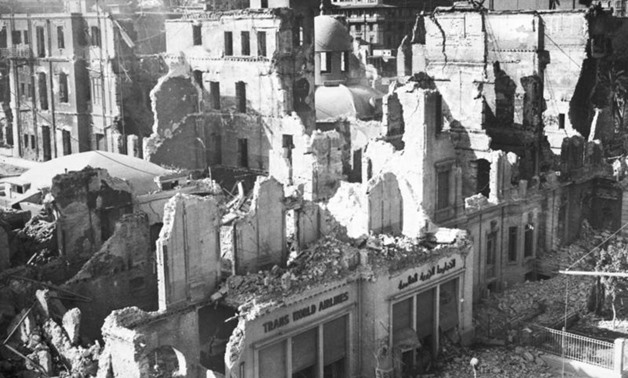
In the centre is part of the famous Shepheards Hotel, in Cairo, Egypt, Jan. 27, 1952, after it was burned the previous day by rioters. In the foreground are the wrecked offices of Trans World Airlines – Wikimedia commons
CAIRO – 8 May 2018: A text in the history book for the final year of the secondary stage of education has triggered criticism against the Education Ministry. Critics claimed that the text’s “incomplete” documentation of the “Cairo Fire” incriminates Egyptian police; the ministry slammed the claim.
The Cairo Fire, also known as Black Saturday, took place in January 1952 under the British occupation of Egypt.
The book’s controversial text reads, “The fedayeen (independent fighters willing to sacrifice themselves) started to attack the British camps. The [Egyptian] government deployed more [auxiliary policemen] to support the fedayeen. When the British [troops] figured out [the government’s plan,] they cordoned Ismailia police station to disarm the policemen on January 25, 1952.”
“However, Fouad Seraj al-Deen, [Egypt’s] Interior Minister [at the time] ordered the [auxiliary policemen] to resist, and consequently, dozens of them (auxiliary policemen) were killed.
When the news reached Cairo, auxiliary policemen there rebelled, which led to the [occurrence of] the Cairo Fire in January 26, 1952,” the text reads.

A crowd marches towards Shepherd Hotel in Cairo, Egypt on Jan. 25, 1952
Teachers’ criticism
Waleed M., a history teacher, said that the context of the text may mislead readers to think that the policemen were accountable for the fire. Some phrases need to be added in order for the true meaning to be understood, Waleed added.
Some teachers in classes and private centers misuse the text to spread wrong information among students, which incriminates policemen, Ahmed A., another history teacher, said, adding that the text has caused disputes between patriot teachers and those who belong to the Muslim Brotherhood.
Historian Gamal Shakra
Defending the auxiliary policemen, historian Gamal Shakra, a professor of contemporary history at Ain Shams University, said that the policemen had rebelled just like any other Egyptian citizen who cared about his country.
Some unknown groups were behind the incident, including the Muslim Brotherhood, as the fall of King Farouk of Egypt was beneficial to the MB, Shakra claimed.
Education Ministry slams claims
Ministry of Education spokesperson Ahmed Khairy slammed critics of the text, saying that the text mentioned that the policemen rebelled following the death of their colleagues in Ismailia, during which the fire took place, adding that the text does not accuse any party of causing the fire.
On January 25, 1952, the British authorities demanded that policemen in Ismailia surrender their weapons and leave the Suez Canal zone. However, Seraj Al-Deen ordered policemen to open fire and fight until the very last bullet. The confrontation reportedly left about 50 policemen dead. For this reason, Egypt celebrates National Police Day on January 25 every year.
No group has officially been held guilty yet for the Cairo Fire, which happened on the following day. Various reports accuse King Farouk, the British occupation and the MB of planning the fire; however, no irrefutable evidence has officially proved the claims.

1952 Cairo fire - Ahram newspaper – Wikimedia commons
The Cairo Fire reportedly killed about 23 people and scorched some 300 shops, 13 grand hotels, 40 cinemas, 16 clubs, and 73 cafes and restaurants, according to media reports.
In 2014, Zaki Al-Beheiry, author of “Mistakes of the Contemporary History Books”, described the history book for the second year of the secondary stage of education as inaccurate, adding that it incorporates 120 disastrous mistakes.
Additional reporting by Amr Kandil



Comments
Leave a Comment